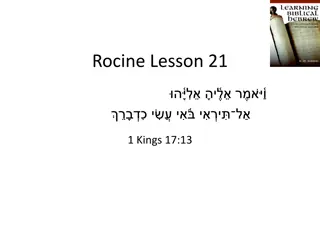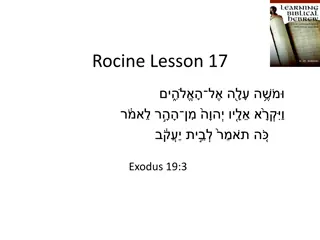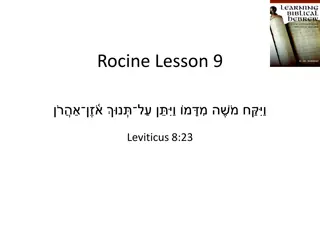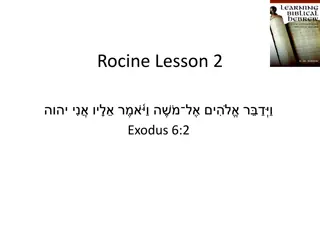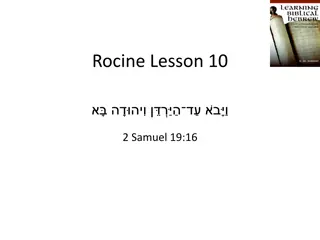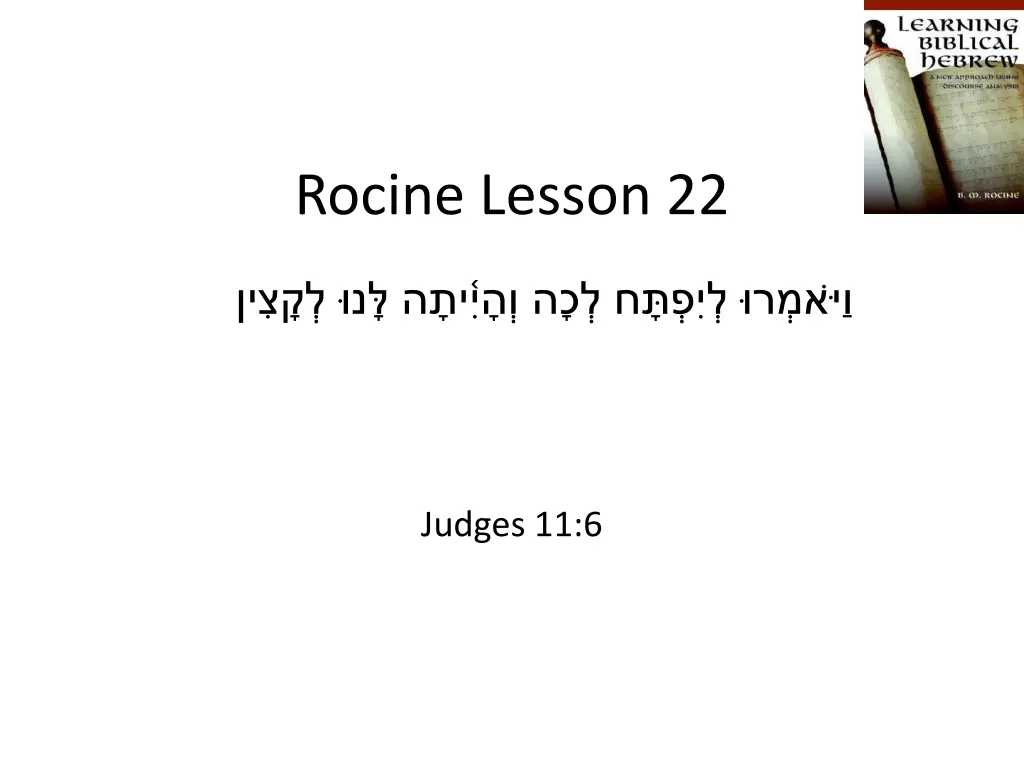
Understanding the Function of Paragogic Heh in Hebrew Imperatives
Explore the use of paragogic heh in Hebrew imperatives, its debated functions, and its significance in understanding the language variations in the Hebrew Bible over time.
Uploaded on | 0 Views
Download Presentation

Please find below an Image/Link to download the presentation.
The content on the website is provided AS IS for your information and personal use only. It may not be sold, licensed, or shared on other websites without obtaining consent from the author. If you encounter any issues during the download, it is possible that the publisher has removed the file from their server.
You are allowed to download the files provided on this website for personal or commercial use, subject to the condition that they are used lawfully. All files are the property of their respective owners.
The content on the website is provided AS IS for your information and personal use only. It may not be sold, licensed, or shared on other websites without obtaining consent from the author.
E N D
Presentation Transcript
Rocine Lesson 22 Judges 11:6
Goals Identify and read Off-line weqatals in Hortatory Discourse. (Also the lengthened imperative and paragogic-heh )
Paragogic heh on the imperative What is the normal imperative of ?
Paragogic heh on the imperative What is the normal imperative of ?
Paragogic heh on the imperative The extra heh (actually qamets-heh) at the end of this imperative is called a paragogic-heh. Paragogic means added to the end. Also known as the lengthened imperative Notice the consequent change to the first vowel. Expect changes here. In the strong verb the first vowel often changes to a qamets-hatuph.
Paragogic heh on the imperative What is the function of the lengthened imperative? This is debated. Possibilities include: 1. Making explicit the expression of intention (as with the cohortative, cf. Rocine Lesson 24) 2. A remnant from its yiqtol origin 3. To express emphasis 4. Regional dialect
Paragogic heh on the imperative What is the function of the lengthened imperative? This is debated. Possibilities include: 1. Making explicit the expression of intention (as with the cohortative, cf. Rocine Lesson 24) 2. A remnant from its yiqtol origin 3. To express emphasis 4. Regional dialect Remember that the Hebrew Bible was written over as many as 1000 years, by people from different regions speaking slightly different forms of Hebrew. In addition, the writing system underwent script and orthographic changes during this time period. It should be of no surprise, therefore, to find language variation in documents covering such a wide spectrum. Undoubtedly we would see even more variation in the final form of the Hebrew Bible had the text not been updated and kept current during its development and transmission.
Weqatal as an off-the-line verb form in Hortatory Discourse 1. Weqatal can stand in for the mainline imperative of Hortatory Discourse (cf. Rocine 19.5a)
Weqatal as an off-the-line verb form in Hortatory Discourse 1. Weqatal can stand in for the mainline imperative of Hortatory Discourse (cf. Rocine 19.5a) It carries on the sense of the imperative that preceded it. The more weqatals, the more mitigated the hortatory discourse. In these situations the weqatal is functioning as a mainline verb.
Weqatal as an off-the-line verb form in Hortatory Discourse 2. Weqatal can also function as an off-line verb. RULE: A weqatal or series of weqatals that are subordinate to or serve the mainline of a Hortatory Discourse are off-the-line verb forms used to give consequence or purpose. Translate the weqatal using the English so for the vav and may be instead of will be.
Weqatal as an off-the-line verb form in Hortatory Discourse means chief or ruler; means Jephthah Try translating this verse with the weqatal as a mainline verb And they said to Jephthah, "Come, andbe our chief." an off-line verb And they said to Jephthah, "Come, so that you may be our chief."
Weqatal as an off-the-line verb form in Hortatory Discourse means chief or ruler; means Jephthah Try translating this verse with the weqatal as a mainline verb Which is it? Is the weqatal 1. a second command or 2. a motivation to do the command? And they said to Jephthah, "Come, andbe our chief." an off-line verb And they said to Jephthah, "Come, so that you may be our chief."
Weqatal as an off-the-line verb form in Hortatory Discourse means chief or ruler; means Jephthah Try translating this verse with the weqatal as a mainline verb Which is it? Is the weqatal 1. a second command or 2. a motivation to do the command? And they said to Jephthah, "Come, andbe our chief." an off-line verb And they said to Jephthah, "Come, so that you may be our chief." There is a cause and effect relationship in this translation.
Weqatal as an off-the-line verb form in Hortatory Discourse A switch in person can indicate a weqatal is off-line. ... (Deut 5:27) You approach, and hear all that YHWH our God speaks, so that we may hear and do.
Weqatal as an off-the-line verb form in Hortatory Discourse A switch in person can indicate a weqatal is off-line. ... (Deut 5:27) You approach, and hear all that YHWH our God speaks, so that we may hear and do. These weqatals are 1cp, not 2ms, so they clearly are not carrying forward the same commands as the two preceding imperatives. This is an unambiguous case of off-line weqatals indicating consequence or purpose.
Weqatal as an off-the-line verb form in Hortatory Discourse A switch in person can indicate a weqatal is off-line. ... (Deut 5:27) You approach, and hear all that YHWH our God speaks, so that we may hear and do. These weqatals are 1cp, not 2ms, so they clearly are not carrying forward the same commands as the two preceding imperatives. This is an unambiguous case of off-line weqatals indicating consequence or purpose.
Review Discourse Profile for Historical Narrative 1. Mainline: ? Off-the-line: 2. Topicalization: ? 3. Relative past background: ? 4. Non-past background: ? 5. Backgrounded activities: ? 6. Transition marker: ? 7. Scene setting: ? 8. Irrealis scene setting: ?
Review Discourse Profile for Historical Narrative 1. Mainline: Wayyiqtol Off-the-line: 2. Topicalization: X-qatal 3. Relative past background: Qatal in dependent clause 4. Non-past background: Yiqtol in dependent clause 5. Backgrounded activities: Participle 6. Transition marker: Mainline form of 7. Scene setting: Verbless Clause 8. Irrealis scene setting: Negation of any verb
Review Discourse Profile for Historical Narrative 1. Mainline: Wayyiqtol Skeleton or Framework Off-the-line: 2. Topicalization: X-qatal 3. Relative past background: Qatal in dependent clause 4. Non-past background: Yiqtol in dependent clause 5. Backgrounded activities: Participle 6. Transition marker: Mainline form of 7. Scene setting: Verbless Clause 8. Irrealis scene setting: Negation of any verb Details: setting, summary, elaboration, etc.
Review Discourse Profile for Historical Narrative Advances the narrative 1. Mainline: Wayyiqtol Skeleton or Framework Off-the-line: 2. Topicalization: X-qatal 3. Relative past background: Qatal in dependent clause 4. Non-past background: Yiqtol in dependent clause 5. Backgrounded activities: Participle 6. Transition marker: Mainline form of 7. Scene setting: Verbless Clause 8. Irrealis scene setting: Negation of any verb Details: setting, summary, elaboration, etc.
Review Discourse Profile for Historical Narrative Advances the narrative 1. Mainline: Wayyiqtol Skeleton or Framework Dynamic action Off-the-line: 2. Topicalization: X-qatal 3. Relative past background: Qatal in dependent clause 4. Non-past background: Yiqtol in dependent clause 5. Backgrounded activities: Participle 6. Transition marker: Mainline form of 7. Scene setting: Verbless Clause 8. Irrealis scene setting: Negation of any verb Details: setting, summary, elaboration, etc.
Discourse Profile Other Genres Historical Narrative Predictive Narrative Instructional Discourse 1. Mainline: Wayyiqtol ? ? Off-the-line: 2. Topicalization: X-qatal 3. Relative past background: Qatal in dependent clause 4. Non-past background: Yiqtol in dependent clause 5. Backgrounded activities: Participle 6. Transition marker: Mainline form of 7. Scene setting: Verbless Clause 8. Irrealis scene setting: Negation of any verb ? ?
Discourse Profile Other Genres Historical Narrative Predictive Narrative Instructional Discourse 1. Mainline: Wayyiqtol Weqatal Weqatal Off-the-line: 2. Topicalization: X-qatal 3. Relative past background: Qatal in dependent clause 4. Non-past background: Yiqtol in dependent clause 5. Backgrounded activities: Participle 6. Transition marker: Mainline form of 7. Scene setting: Verbless Clause 8. Irrealis scene setting: Negation of any verb X-yiqtol X-yiqtol
Discourse Profile (to date) for Hortatory Discourse 1. Mainline: a. Imperative b. Weqatal (for Mitigated Hortatory Discourse) Off-the-line: 2. Topicalization: X-Imperative 3. Prohibitive Commands: or + yiqtol 4. Consequence, purpose: Weqatal 5. Backgrounded activities: Participle 6. Scene setting: Verbless Clause
Discourse Profile (to date) for Hortatory Discourse 1. Mainline: a. Imperative b. Weqatal (for Mitigated Hortatory Discourse) 2 mainline verbs Off-the-line: 2. Topicalization: X-Imperative 3. Prohibitive Commands: or + yiqtol 4. Consequence, purpose: Weqatal 5. Backgrounded activities: Participle 6. Scene setting: Verbless Clause
Discourse Profile (to date) for Hortatory Discourse 1. Mainline: a. Imperative b. Weqatal (for Mitigated Hortatory Discourse) 2 mainline verbs Off-the-line: 2. Topicalization: X-Imperative 3. Prohibitive Commands: or + yiqtol 4. Consequence, purpose: Weqatal 5. Backgrounded activities: Participle 6. Scene setting: Verbless Clause 2 weqatals
Discourse Profile (to date) for Hortatory Discourse 1. Mainline: a. Imperative b. Weqatal (for Mitigated Hortatory Discourse) 2 mainline verbs Off-the-line: 2. Topicalization: X-Imperative 3. Prohibitive Commands: or + yiqtol 4. Consequence, purpose: Weqatal 5. Backgrounded activities: Participle 6. Scene setting: Verbless Clause 2 weqatals Negation fairly high in the Discourse Profile, though still off-line.

